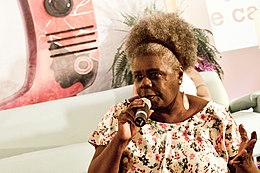Conceição Evaristo
Conceição Evaristo | |
|---|---|
 Evaristo in 2013 | |
| Born | Maria da Conceição Evaristo de Brito 29 November 1946 Belo Horizonte, Minas Gerais, Brazil |
Maria da Conceição Evaristo de Brito (born 29 November 1946) is a Brazilian writer.[1] Her work is marked by her life experiences as an Afro-Brazilian woman, which she calls escrevivência—a portmanteau of escrita (writing) and vivência (life experience).[2] She was born into a humble family and is the second oldest of 9 siblings, being the first in her household to earn a university degree. She helped her mother and aunt with washing clothes and deliveries, while studying.[3]
In the 1970s, she moved to Rio de Janeiro, where she passed a contest, starting to write only in the 1990s.[4] She completed her master's degree in the mid-1990s and her doctorate in the early 2010s.[5][6]
Biography[edit]
Conceição was born in a favela in the southern area of Belo Horizonte, to a very poor family with nine brothers and her mother.[7]
She had to work as a domestic servant during her youth until she finished her normal course in 1971, at the age of 25. She moved to Rio de Janeiro, where she was approved on a civil service exam to be a teacher and studied Letters at Federal University of Rio de Janeiro.[8] In the 1980s, Evaristo got in touch with the Quilombhoje group. She made her debut in literature in 1990, with works published in the series Cadernos Negros, published by the organization.[9]
She earned a master's degree in Brazilian Literature from PUC-Rio in 1996, and a PhD in Comparative Literature from Universidade Federal Fluminense in 2011.[9] Her works, especially the novel Ponciá Vicêncio (2003), address themes such as racial, gender and class discrimination. In 2007, her first novel, Ponciá Vicêncio, became the focus of a Master's thesis in Brazil, the first one on the author.[10] The novel was translated into English and published in the United States also in 2007.[11] She currently teaches at UFMG as a visiting professor.[9]
In 2018, she was nominated for a chair at the Brazilian Academy of Letters, and lost to filmmaker Cacá Diegues by 22 votes to 1.[12] The Caribbean Philosophical Association awarded its 2018 Nicolás Guillén Lifetime Achievement Award to Conceição Evaristo.[13]
Conceição Evaristo is a great exponent of contemporary Brazilian literature. She writes about race, gender and class discrimination, especially of black women.[14]
Works[edit]
Novels[edit]
- Ponciá Vicêncio (2003)
- Becos da Memória (2006)
- Canção para Ninar Menino Grande (2022)
Poetry[edit]
- Poemas da recordação e outros movimentos (2008)
Short stories[edit]
- Insubmissas lágrimas de mulheres (Nandyala, 2011)
- Olhos d'água (Pallas, 2014)
- Histórias de leves enganos e parecenças (Editora Malê, 2016)
Participation in anthologies[edit]
- Cadernos Negros (Quilombhoje, 1990)
- Contos Afros (Quilombhoje)
- Contos do mar sem fim (Editora Pallas)
- Questão de Pele (Língua Geral)
- Schwarze prosa (Germany, 1993)
- Moving beyond boundaries: international dimension of black women's writing (1995)
- Women righting – Afro-brazilian Women's Short Fiction (England, 2005)
- Finally Us: contemporary black brazilian women writers (1995)
- Callaloo, vols. 18 e 30 (1995, 2008)
- Fourteen female voices from Brazil (USA, 2002)
- Chimurenga People (South Africa, 2007)
- Brasil-África
- Je suis Rio (Anacaona, 2016)
References[edit]
- ^ "Conceição Evaristo: Poemas da recordação e outros movimentos" (in Portuguese). Vermelho. 27 February 2012. Archived from the original on 9 August 2017. Retrieved 10 November 2017.
- ^ Cazes, Leonardo (11 July 2016). "Conceição Evaristo: a literatura como arte da 'escrevivência'". O Globo (in Portuguese). Retrieved 10 November 2017.
- ^ "Conceição Evaristo – Biografia, obras, poemas e frases". Escola Educação (in Brazilian Portuguese). 24 October 2018. Retrieved 21 February 2020.
- ^ "Maria da Conceição Evaristo, a voz da mulher negra na literatura". R7.com (in Brazilian Portuguese). 11 July 2019. Retrieved 21 February 2020.
- ^ "Conceição Evaristo: biografia, principais obras – Brasil Escola". Meu Artigo Brasil Escola (in Brazilian Portuguese). Retrieved 21 February 2020.
- ^ Cultural, Instituto Itaú. "Conceição Evaristo". Enciclopédia Itaú Cultural (in Brazilian Portuguese). Retrieved 21 February 2020.
- ^ "Conceição Evaristo: Biography and Poems | Brazilian Poetry". Retrieved 30 May 2021.
- ^ Duarte, Eduardo de Assis (April 2006). "O Bildungsroman afro-brasileiro de Conceição Evaristo". Revista Estudos Feministas. 14 (1): 305–308. doi:10.1590/S0104-026X2006000100017. ISSN 0104-026X.
- ^ a b c "Conceição Evaristo – Literatura Afro-Brasileira". www.letras.ufmg.br (in Brazilian Portuguese). Archived from the original on 10 November 2017.
- ^ Santos de Araújo, Flávia (2007). "UMA ESCRITA EM DUPLA FACE: A MULHER NEGRA EM PONCIÁ VICÊNCIO, DE CONCEIÇÃO EVARISTO" (PDF). PPGL-UFPB. Archived (PDF) from the original on 22 January 2021.
- ^ Barbosa, Maria José Somerlate (1 November 2011). "Ponciá Vicencio". Review: Literature and Arts of the Americas. 44 (2): 325–326. doi:10.1080/08905762.2011.614494. ISSN 0890-5762.
- ^ Betim, Felipe (31 August 2018). "ABL frustra expectativas de campanha por Conceição Evaristo e elege Cacá Diegues como novo imortal". El País (in Portuguese). Retrieved 30 September 2018.
- ^ "Nicholas Guillen Award". www.caribbeanphilosophicalassociation.org. Archived from the original on 3 October 2018. Retrieved 3 October 2018.
- ^ "Conceição Evaristo: Biography and Poems | Brazilian Poetry". Retrieved 29 May 2021.
